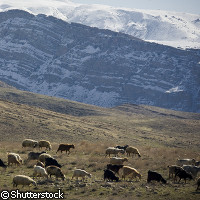European males descend from ancient farmers
Researchers from the University of Leicester in the UK have found that most European males descended from the first farmers who migrated from the Near East around 10,000 years ago. The results of the study are published in the journal PLoS (Public Library of Science) Biology. The research, which was funded by UK charity the Wellcome Trust, looked at the diversity of the Y chromosome which is passed down from father to son. It is generally agreed that our modern civilisation began with the invention of farming and agriculture. Before that, human beings lived as hunter gatherers foraging for food and moving on when food supplies ran out. Farming spread into Europe from the `Fertile Crescent¿, a region in Western Asia that extended from the eastern Mediterranean coast to the Persian Gulf and into the Tigris and Euphrates valleys, the ancient land of Mesopotamia. The cultivation of land triggered the most important social change in the history of modern human civilisation. Farming encouraged humans to stay in one place, and more reliable food sources meant the population began to rise, leading to the 7 billion people that now populate the planet. The question of whether farming practices spread because of migration or because of the spread of agricultural ideas and technology to hunter gatherers is still open to debate. But the current research which looked at the genetic diversity of modern populations has thrown some light on this. Professor Mark Jobling, who led the research team, said: 'We focused on the commonest Y-chromosome lineage in Europe, carried by about 110 million men - it follows a gradient from south-east to north-west, reaching almost 100% frequency in Ireland. We looked at how the lineage is distributed, how diverse it is in different parts of Europe and how old it is.' The research results suggest that this lineage spread with farming from the Near East. Lead author Dr Patricia Balaresque said, 'In total, this means that more than 80% of European Y chromosomes descend from incoming farmers. In contrast, most maternal genetic lineages seem to descend from hunter-gatherers. To us, this suggests a reproductive advantage for farming males over indigenous hunter-gatherer males during the switch from hunting and gathering, to farming - maybe, back then, it was just sexier to be a farmer.'
Countries
United Kingdom



